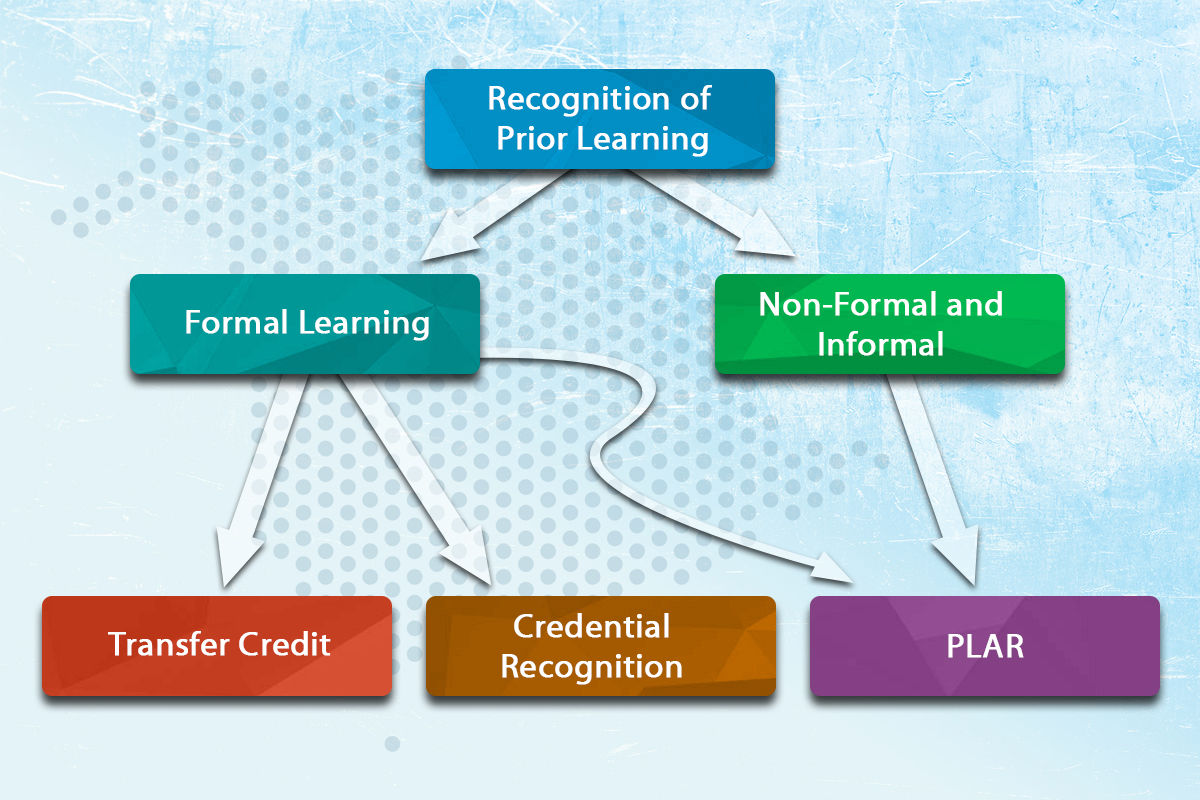
What is PLAR?
PLAR is Prior Learning And Recognition and acknowledges the learning that you’ve done outside the typical classroom. Do you have skills and knowledge from past work experience? Volunteering? Traveling? If so, PLAR may be a great choice to continue your journey.
PLAR refers to all forms of prior learning experience, assessment, recognition and formal accreditation of prior learning. As the following graphic illustrates, PLAR encompasses three distinct fields of assessment and recognition: credential assessment, credit transfer and PLAR.
Understanding Prior Learning Assessment and Recognition (PLAR)
Prior Learning Assessment and Recognition (PLAR), involves a systematic process of identification, documentation, assessment and recognition of an individual’s prior learning (i.e., skills, knowledge and values).
This learning may have been acquired through formal and/or informal study, including work and life experience, training, independent study, volunteer work, travel, hobbies, etc. PLAR processes can be used to help individuals meet the requirements of education and training programs; occupational and/or professional certification; labour market entry; and organizational and human resource capacity building.
The goals of prior learning assessment and recognition include:
- identification of learning, wherever it has taken place
- selection of that learning relevant to a desired outcome career or occupational plan
- demonstration of the validity and appropriateness of the learning
- matching learning outcomes to those stated within a chosen accreditation or progression framework
- assessment of evidence against predetermined criteria to ensure the validity of the claimed learning
- accreditation within an appropriate and recognized accreditation framework

The Role of PLAR
Universities
Prior Learning Assessment (PLA) refers to the systematic evaluation of a student’s previous learning and its relationship to the expected learning outcomes of university courses and programs in which the candidate is enrolled for the purpose of granting credit where appropriate
Community Colleges
Prior Learning Assessment and Recognition (PLAR) is a process of identifying, documenting, assessing and recognizing skills, abilities and knowledge that have been acquired through formal or informal learning. Through PLAR, colleges and institutes can facilitate the recognition of foreign credentials based on education and work experience gained prior to coming to Canada.
Industry
Prior Learning Assessment and Recognition (PLAR) is a process that captures and recognizes an individual’s learning in the workplace, in the classroom and in the community.
PLAR can describe competencies and help to measure performance while documenting the skills and knowledge needed for a job.
PLAR can assist the unemployed to:
- identify learning needs to create continuous learning plan
- apply prior knowledge, skills and experience to a workplace context
- Organize/structure job search activities
PLAR can assist employees to:
- identify learning needs to create continuous learning plan
- demonstrate what they know and are able to do
- clarify employment goals
- gain academic credits, occupational certification or promotion/mobility within the workplace
PLAR can assist employers to:
- understand employees’ skills, knowledge and training needs
- develop appropriate workplace training
- recruit, develop and retain a workforce,
- clarify learning goals and outcomes, including succession plans
- define, document and verify processes
PLAR can assist regulatory bodies to:
- identify competencies
- benchmark competencies against established standards
- create competency-based assessment

Community-based Organizations
PLAR is a process of identifying, assessing and recognizing a person’s knowledge, skills and expertise, gained through life/work experiences, whenever or wherever the learning has taken place.
PLAR Programs for Internationally Educated/Trained candidates “provide for training that allows them to acquire the knowledge & skills necessary to bridge the gap between their prior learning and the requirements of their occupations in Canada.”
